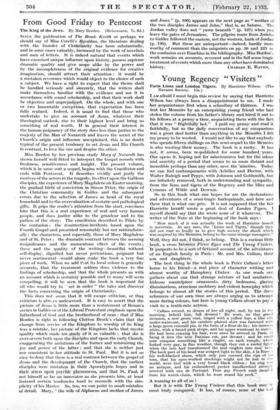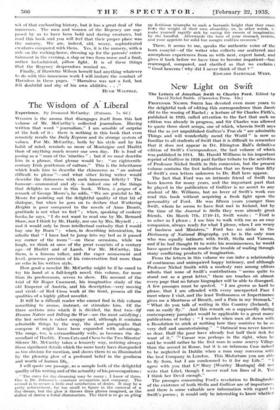Young Regency " Visiters "
I Am afraid I must begin this review by saying that Harriette Wilson has always been a disappointment to me. I„ made her acquaintance first when a schoolboy of thirteen. I was lent her Memoirs by an enterpriiiiig ,young friend 'who had stolen the volume from his father's library and hired, it out to his fellows at a penny a time acquainting them With the fact
that it was "frightfully hot." ,. I paid my penny and read it faithfully, but as the daily conversation of my companions was a great deal hotter than anything in the Memairs .I felt my penny to be wasted. I would not like to say that anybody who spends fifteen shillings on this semi-sequel to the Memoirs is also wasting their money. The book is a rarity-. It has not, it seems, been republished for some hundred; years. One opens it hoping not for salaciousness but for the odour and saiictitY Of a period that seems to us more distant' and incredible perhaps than any other, save the 'nineties. Today
we can feel contemporaries with Achilles and Hector, with Walter Raleigh and Pepys, with Johnson and Goldsmith, but
are infinitely- removed, both in understanding and 'sympathy, from the lions and tigers Of the Regency and the lilies and Cynaras of Wilde. and Dowson.
So in this -book What. One hopes for are the declarations and adventures of a semi-tragic harlequinade, and here and there that is what one gets. It is not supposed that the fair Harriette herghlf wrote a great deal of London Tigers. I myself should say that she wrote none of it whatever. The writer of the Note at the beginning of the book says: " How much of it was actually the work of Harriette herself is uncertain. At any rate, the 'Lions and Tigers,' though they did' not roar so loudly as to give high society the shock which was inspired by the Meinciirs, belong to the same strange menagerie."
Well,; they did not I think, so 'belong. This is a curious little book, a cross betWi'en. Pierce Egan and The Young Visiters. Ilipurports to be a' sort Of flctiOnaiaccount'of the adirehtures of an English family in Paris : Mr. and Mrs. Callarn,, their
son and daughters.
The'best thing in the whole book is Peter Callam's letter
'home to' his friend—a real piece of character . writing and almost worthy of Humphrey Clinker. As one reads one gathers about ,one that strange mixture of bad sanitation, hideous mantelpiece ornaments, dirty bedrooms, glaring illuminations, atrocious snobbery and violent horseplay which -belongs to almost all the stories of this period. The dress reformers of our own time are always Urging us to attempt more daring colours, but here is young Callam about to pay a visit to a tenth-rate actress.
" Callam retired, to dream of her all night, and, by ten in the morning, behold him, full dressed! He wore, on this grand ocettsion, a nevi green coat, tinged with a yellow hue, a lilac silk under-waistcoat, and his cambric plaited shirt was fastened with a large green emerald pin, in the form of a fleur-de-lis ; his browsers white, with a' broad pink stripe, and his upper waistcoat to match. He had been scoaxing his hair, ever since he arrived in Paris, to bring it into the true _Parisian cut, par devant ; and he could now Compass something like' a ringlet, on each temple,' which looked very gay; in fine weather, though they cut a rueful figure when the rain had transformed the said ringlets into rats' tails. The back part of his head was scraped tight to the skin, i is Russc ; his well-blacked shoes, which only just covered the tips of his toes, that his open-worked stockings might not be lost to the world, were tied with a very broad black ribbon ; his ring was an antique, and his embroidered pocket handkerchief strongly scented with eau de Portugal. Four gay French seals dangled from his watch-chain, which he wore round his neck."
, A warning to all of us ! But it is with The Young VLsiters that this book may be most truly Compared. It has, of course, none of the real wit of that enchanting history, but it has a great deal of the innocence. The men and women of the Regency are sup- posed by us to have been bold and daring creatures, but read this book and you will feel that their proper, place was the nursery. We are, indeed, old, weary, sophisticated creatures compared with them. Yes, it is the nursery, with a ride on the rocking-horse, dressing up for the parents' enter- tainment in the evening, a slap or two from nurse and a final, rather lackadaisical, pillow fight. It is of these things that the Regency desperadoes remind us.
• Finally, if Harriette Wilson herself had anything whatever to do with this innocuous work I will imitate the conduct of Harmless in these pages. "-Harmless was not-a fool, but felt doubtful and shy of his own abilities. . . ."
Ryan WALPOLE.



















































 Previous page
Previous page